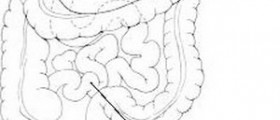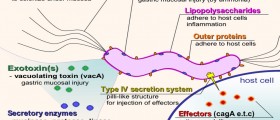
Provokers and indicators
Gastritis is the medical term for the inflammatory process that happens over the inner mucous membrane of the stomach. The types of this disorder are arranged into the two large groups; the chronic gastritis (characterized by the permanent and recurrent symptoms), and the acute, also called the Acute Dyspepsia, which is manifested as the sudden and intense onset of the most prominent indicators.
The most common provokers of this inflammation (which is the natural bodily response to them), are the unhealthy eating habits, such as not chewing the food enough times, swallowing quickly, overeating and eating the foods that irritate the lining of the stomach (e.g. too hot, too cool and the spicy foods), even swallowing the large quantity of mucus. However, the acute form of gastritis may as well be triggered by some underlying condition, such as cholera (which leads to rather a frequent urge for throwing up), gout, tuberculosis, syphilis and rheumatism, for instance. All these provoke the irritation, manifested as the redness and swelling, and, thus, the damage to the delicate lining of the stomach.
Additionally, during the process of the degeneration, the lining becomes uneven, with certain protuberant formations and the intertubular tissue tends to infiltrate. Therefore, with the depletion of the hydrochloric acid in the gasric fluid, there is the beneficial surrounding created for the formation of an ulcer and the possible bleeding.
The following troubles
As far as the prominent indicators are concerned, in the case of the not so severe form of gastritis and in the early stages of this disease, the troubles with the process of the digestion are predominant. The most pointed out is the sensation of rather argent discomfort felt in the stomach, the constant ache and the urge for throwing up. So, everything is difficult to be digested. Besides that, the condition may be followed by bloating, the act of belching, the blockage of the stool, or the bland stool, halitosis with the bitter flavor n the mouth and the transparent film over the tongue. On the other hand, when the condition is advanced, all these signs are followed with the increased temperature of the body, the severe blockage of the stool, the increased pulse rate, the dried skin and the urine becomes darker, rarer and filled with the urates. Also, through the process of throwing up, the patient expels all the contents that wasn’t digested, bile and the mucus.
In addition, if gastritis is caused by some poisonous substance, the most prominent symptom is the unquenchable thirst. Also, the affected person experiences the short breaths, and the numbness and coldness over the hands and feet. This condition can be a life-threatening, and in the most aggravated cases, it grows into coma. So, the problem should be treated at the very first stages and the first aid includes irrigation of the stomach with the salty liquid, combined with the proper eating regime based on the foods which are easily digested, while in the advanced stages, after the irrigation, the patient must undergo the therapy with the drops of aconite and ipecac and the conventional treatment of the accompanying health problems.

















Your thoughts on this
Loading...